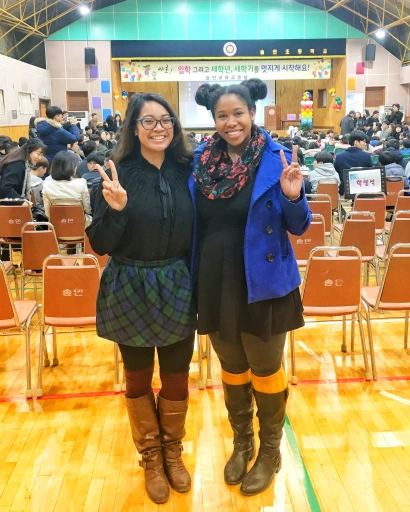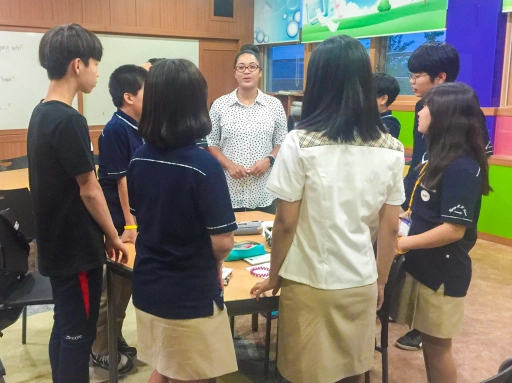Originally published August 16, 2020
Teaching English abroad sounds like a dream to most. For me, it was a dream come true. I followed my passion to South Korea and overall, I have no complaints about my four years as a Native English Teacher in The Land of the Morning Calm.
This Thursday, August 20th at 9am PST, I’ll be presenting on What It’s Like to Live and Teach English in South Korea to The Nomadic Network. If you’re interested in living or teaching English there, come and join us! If you’re not, but would like to visit South Korea one day, you can join too – I’ll be giving you tips on traveling with in the country.

While I will be going over the basic requirements and how to go about finding a job teaching English in South Korea, there’s only so much I can put into an hour-long presentation. Something that I won’t be able to get to (unless it comes up in the Q&A portion!) are things that I wish I knew about before going to teach English there.
South Korea wasn’t even on my radar until a friend suggested I look into teaching there because I wanted to get out of the USA as soon as possible and it was hiring season, so I didn’t know much about the country or culture before I applied. *Don’t judge!*
Looking back on my time teaching in a South Korean public school, here are a some of the things I wish I’d known about the position and culture.
Deskwarming
To put it simply, deskwarming is going to your school but not doing any teaching. This could be during school holidays, when English classes are canceled, or while the rest of the school is on summer and winter vacation.
As foreigners, our working contracts are different from our Korean colleagues. When school is not in session, they don’t have to come in. If we are not using our vacation days, we do.
So what do you do for 8 hours? Plan lessons….supposedly. But there are only so many lessons you can plan ahead, and most teachers find themselves watching Netflix, working on other personal projects, or biding the time in other ways while sitting in their empty classrooms or offices.
After a full semester, deskwarming days are welcome, but after a few days of deskwarming it can be a BORE!
Stress & Pressure on Students
From a young age, there is an overwhelming pressure put on Korean children and students. It starts at being put into ESL Kindergartens at 3 or 4 years old. In elementary, middle, and high school students, it’s not uncommon to hear about their packed schedules full of music, sports, or tae-kwon-do on top of hours of tutoring or going to a hagwon for extra academic classes, while still having to find time for homework. Other activities or classes were often the excuse for my elementary students not finishing their one worksheet I gave them as homework.
My high school students that I taught in my first year stayed at school until 10pm almost every weekday and told me they kept working until 2am only to wake up at 6am to get in more studying before school and do it all over again. The pressure of achieving high test scores in school and for Suneung (the Korean equivalent to the SATs/ACTs) was insurmountable.
As their teacher and a foreigner, it was a tough pill to swallow. When they fell asleep in class, got sick, or I could plainly see the stress on their young faces, my heart broke each time. Despite my feelings, I had to accept that this was a cultural norm I had to accept.
While I couldn’t change that, I COULD make my classes as fun, engaging, and stress-free as possible. Tapping into my creative side daily for my students gave me so much joy.

Don’t write someone’s name in red!
This isn’t specifically for teaching, but in the Korean culture the names of the dead are written in red ink. Writing a living person’s name in red is a BIG NO-NO.
I didn’t know this and had made seating charts with my students’ names in my first semester using red ink. When reviewing the seating chart with my co-teacher to practice their names (before I could read Hangul, the Korean alphabet), she would go over the names I’d written in black ink. I guess I had a confused look as she did so.
Trying to avoid me “Losing Face” by not calling me out for doing something wrong (another aspect of Korean culture), my co-teacher simply said that the students didn’t like their names written in red.
When I later learned about the superstition, I was so embarrassed and apologized to my students.
Last Minute Notices and Schedule Changes
As the foreign English teacher, you will undoubtedly experience being told things last minute, if at all. For example, your class may be cancelled and you don’t know until you walk into class and no one is there. By the way, when something needs to be cancelled in order to make room for another thing, English class is always first – at least in many public schools.
Or, like in my first year, you may not be told that picture day is coming up so you come to school dressed down because all the students are on a field trip and you’re just deskwarming for the day, but someone comes to the office to ask why you aren’t getting your picture taken.
Sometimes they might even ask you to do the impossible, like come to you in the last hour of your workday to ask that you turn in a two week summer camp outline and plan…the next morning!
It goes without saying that this can be highly frustrating especially as frequently as it happens. Being the foreign teacher, you are left out of many decision making processes and are just told things after they have been decided for you.
This is just another one of those things you can’t change, but just have to learn to roll with it.
All in all, none of these things ruined my experience or had any negative impact on me, but I hope the insight provided helps give you a peek further into the English Teaching culture in South Korea!
With wanderlust & ‘til next time,
Ava

